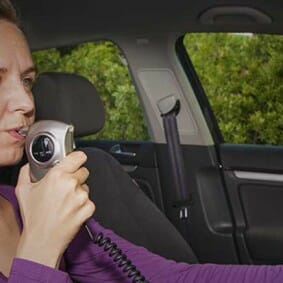April 28th, 2015 by Attorney Dan Carman

Senate Bill 133, commonly known as the DUI Interlock Bill, will take effect in late June, making Kentucky the 25th state to require breath-alcohol monitors in the vehicles of those who have been caught driving drunk.
While the details vary among the states, the underlying goal of deterring drunk drivers is consistent.
Aggravating factors include driving more than 26 miles per hour over the posted limit, having a passenger under the age of 12 and causing an accident that resulted in serious injury or death.
How Does Ignition Interlock Work?
About the size of a mobile phone, an ignition interlock is installed on a vehicle’s dashboard and works similarly to a breathalyzer. Drivers have to blow into the device in order to start the engine. The vehicle will not start if the analyzed result of blood alcohol concentration is higher than the programmed limit of 0.02 percent. Once started, the device also randomly requires more breath samples in order to prevent someone other than the driver from providing one.
If samples aren’t provided or if they are above the interlock’s preset level, the device will warn the driver and then begin flashing the lights or honking the horn until the ignition is turned off or a clean breath sample is provided. The interlock keeps a record, which is accessed each time the device’s sensors are calibrated (usually at 30, 60 or 90 days) and periodically reviewed. If it’s discovered that the driver has violated the DUI law again, additional penalties can be applied.
Is Ignition Interlock Effective?
While Mothers Against Drunk Driving (MADD) has been campaigning nationwide to mandate ignition locks for anyone convicted of drunk driving, others have argued that the requirement is unfair to first-time offenders. Data from the National Highway Traffic Safety Administration has shown that the blood alcohol concentration for the majority of drunk drivers in fatal accidents was an average of 0.18 percent — more than twice the legal limit. Certainly it would seem that not allowing judges to distinguish between drivers who have had a few drinks and are slightly over the legal limit from those who are way over is a slippery slope toward a zero-alcohol tolerance policy.
DUI convictions in KY can involve fines, license suspensions, jail time, alcohol-driver education programs and now ignition interlocks. At the Lexington, KY-based Dan Carman Law Firm, we understand that’s a lot of potential punishment. We offer thorough, experienced representation and aggressive defense. Call today at (859) 685-1055 or fill out this online contact form to find out how we can help you.

 Focusing on criminal matters, Mr. Carman is admitted to practice law in all Courts of the Commonwealth of Kentucky, the United States District Courts for the Eastern and Western Districts of Kentucky, and the United States Court of Appeals, Sixth Circuit. He is a member of the American, Kentucky, and Fayette County Bar Associations. Mr. Carman also worked as a prosecutor, as well as a legal assistance attorney. Attorney Dan Carman can help you with any criminal defense matters you may need including; DUI, drug, and weapons charges, trespassing, traffic violations and more. [
Focusing on criminal matters, Mr. Carman is admitted to practice law in all Courts of the Commonwealth of Kentucky, the United States District Courts for the Eastern and Western Districts of Kentucky, and the United States Court of Appeals, Sixth Circuit. He is a member of the American, Kentucky, and Fayette County Bar Associations. Mr. Carman also worked as a prosecutor, as well as a legal assistance attorney. Attorney Dan Carman can help you with any criminal defense matters you may need including; DUI, drug, and weapons charges, trespassing, traffic violations and more. [